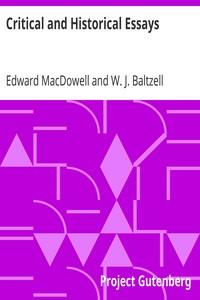|
|
Read this ebook for free! No credit card needed, absolutely nothing to pay.Words: 71834 in 18 pages
This is an ebook sharing website. You can read the uploaded ebooks for free here. No credit cards needed, nothing to pay. If you want to own a digital copy of the ebook, or want to read offline with your favorite ebook-reader, then you can choose to buy and download the ebook.

: Critical and Historical Essays Lectures delivered at Columbia University by MacDowell Edward Baltzell W J Winton James Editor - Music History and criticism Music@FreeBooksTue 06 Jun, 2023 to originate a musical instrument, it did, nevertheless, bring into existence music's greatest prop, rhythm, an ally without which music would seem to be impossible. It is hardly necessary to go into this point in detail. Suffice it to say that the sense of rhythm is highly developed even among those savage tribes which stand the lowest in the scale of civilization to-day, for instance, the Andaman Islanders, of whom I shall speak later; the same may be said of the Tierra del Fuegians and the now extinct aborigines of Tasmania; it is the same with the Semangs of the Malay Peninsula, the Ajitas of the Philippines, and the savages inhabiting the interior of Borneo. As I have said, this more or less rhythmic clanking of stones together, the striking of wooden paddles against the side of a canoe, or the clashing of stone spearheads against wooden shields, could not constitute the first musical instrument. But when some savage first struck a hollow tree and found that it gave forth a sound peculiar to itself, when he found a hollow log and filled up the open ends, first with wood, and then--possibly getting the idea from his hide-covered shield--stretched skins across the two open ends, then he had completed the first musical instrument known to man, namely, the drum. And such as it was then, so is it now, with but few modifications. Up to this point it is reasonable to assume that primeval man looked upon the world purely subjectively. He considered himself merely a unit in the world, and felt on a plane with the other creatures inhabiting it. But from the moment he had invented the first musical instrument, the drum, he had created something outside of nature, a voice that to himself and to all other living creatures was intangible, an idol that spoke when it was touched, something that he could call into life, something that shared the supernatural in common with the elements. A God had come to live with man, and thus was unfolded the first leaf in that noble tree of life which we call religion. Man now began to feel himself something apart from the world, and to look at it objectively instead of subjectively. To treat primitive mankind as a type, to put it under one head, to make one theorem cover all mankind, as it were, seems almost an unwarranted boldness. But I think it is warranted when we consider that, aside from language, music is the very first sign of the dawn of civilization. There is even the most convincingly direct testimony in its favour. For instance: It is granted that all this, in itself, is not conclusive; but it will be found that no matter in what wilderness one may hear of a savage beating a drum, there also will be a well-defined religion. I have spoken of the purely rhythmical nature of the pre-drum period, and pointed out, in contrast, the musical quality of the drum. This may seem somewhat strange, accustomed as we are to think of the drum as a purely rhythmical instrument. The sounds given out by it seem at best vague in tone and more or less uniform in quality. We forget that all instruments of percussion, as they are called, are direct descendants of the drum. The bells that hang in our church towers are but modifications of the drum; for what is a bell but a metal drum with one end left open and the drum stick hung inside? Strange to say, as showing the marvellous potency of primeval instincts, bells placed in church towers were supposed to have much of the supernatural power that the savage in his wilderness ascribed to the drum. We all know something of the bell legends of the Middle Ages, how the tolling of a bell was supposed to clear the air of the plague, to calm the storm, and to shed a blessing on all who heard it. And this superstition was to a certain extent ratified by the religious ceremonies attending the casting of church bells and the inscriptions moulded in them. For instance, the mid-day bell of Strasburg, taken down during the French Revolution, bore the motto "I am the voice of life." Another one in Strasburg: "I ring out the bad, ring in the good." Others read "My voice on high dispels the storm." Free books android app tbrJar TBR JAR Read Free books online gutenberg More posts by @FreeBooks
: Curiosities of Literature Vol. 2 by Disraeli Isaac Disraeli Benjamin Earl Of Beaconsfield Editor - English literature History and criticism; Literature Anecdotes; Litterateurs Bibliomania@FreeBooksTue 06 Jun, 2023

: The Book of the Bush Containing Many Truthful Sketches of the Early Colonial Life of Squatters Whalers Convicts Diggers and Others Who Left Their Native Land and Never Returned by Dunderdale George Macfarlane J Illustrator - Australia Description and trav@FreeBooksTue 06 Jun, 2023

: Combed Out by Voigt F A Frederick Augustus - World War 1914-1918 Personal narratives English World War I@FreeBooksTue 06 Jun, 2023
|
Terms of Use Stock Market News! © gutenberg.org.in2025 All Rights reserved.






